PowerA Fusion Pro Controller review: Luxury features at a low price on Xbox One and Windows
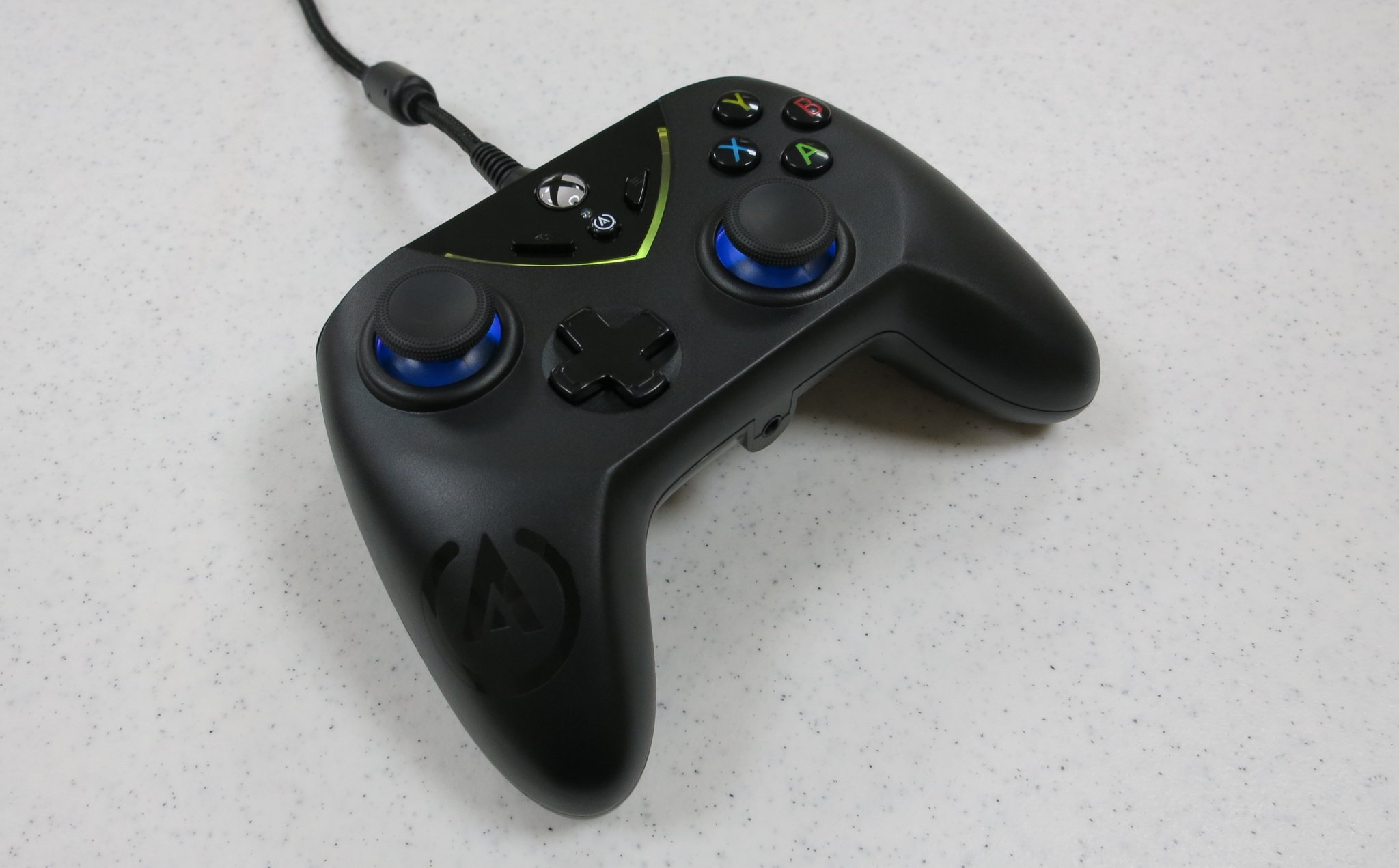
This year the Xbox One has received not one but two luxury controllers: Microsoft's Elite Wireless Controller and the Razer Wildcat. Both offer a number of features you won't find on a regular controller, such as extra programmable buttons and trigger locks. But they also ring up at $149.99 a pop, which will break many a gamer's bank. Wouldn't it be nice to have a more affordable option in advanced controllers?
PowerA (makers of the Mini Series Controller and a bunch of Star Wars controllers) have just the thing for gamers who can't or don't want to spend one-and-a-half Benjamins on a luxury Xbox One controller. The Fusion Pro Controller is a wired controller with many of the same features as the Elite and Wildcat. The big difference is that it only costs $79.99. Read our detailed review with video to find out whether the Fusion Pro Controller can stand up to the big boys!
Wrap that cord
Unlike the Elite Controller and Razer Wildcat, the Fusion Pro Controller doesn't come with a carrying case. PowerA has to keep costs down in order to sell the controller at such a low price point, after all. You could always buy a generic controller case if you really want one.
That said, the Fusion Pro does at least come with a decent cord wrap. The black rubber wrap features the PowerA logo. It has a number of grooves which can slide over two orange pegs, keeping the wrap in place. Although the wrap is a good idea in concept, the actual design doesn't stick the landing…
The portion of the wrap with the PowerA logo doesn't have any grooves, which creates a large area that can't connect to the orange pegs. Basically, you can't tighten the wrap as much as you'd expect because of the logo area. It's still good enough for wrapping the entire cable up during transportation, but not great at wrapping only a portion of the cord during use to reduce clutter.
As for the USB cable itself, it can't be detached like the Elite and Wildcat cables. But it measures a generous 9.8 feet and features a break-away end. And it's braided, so it should outlast standard rubber cords.
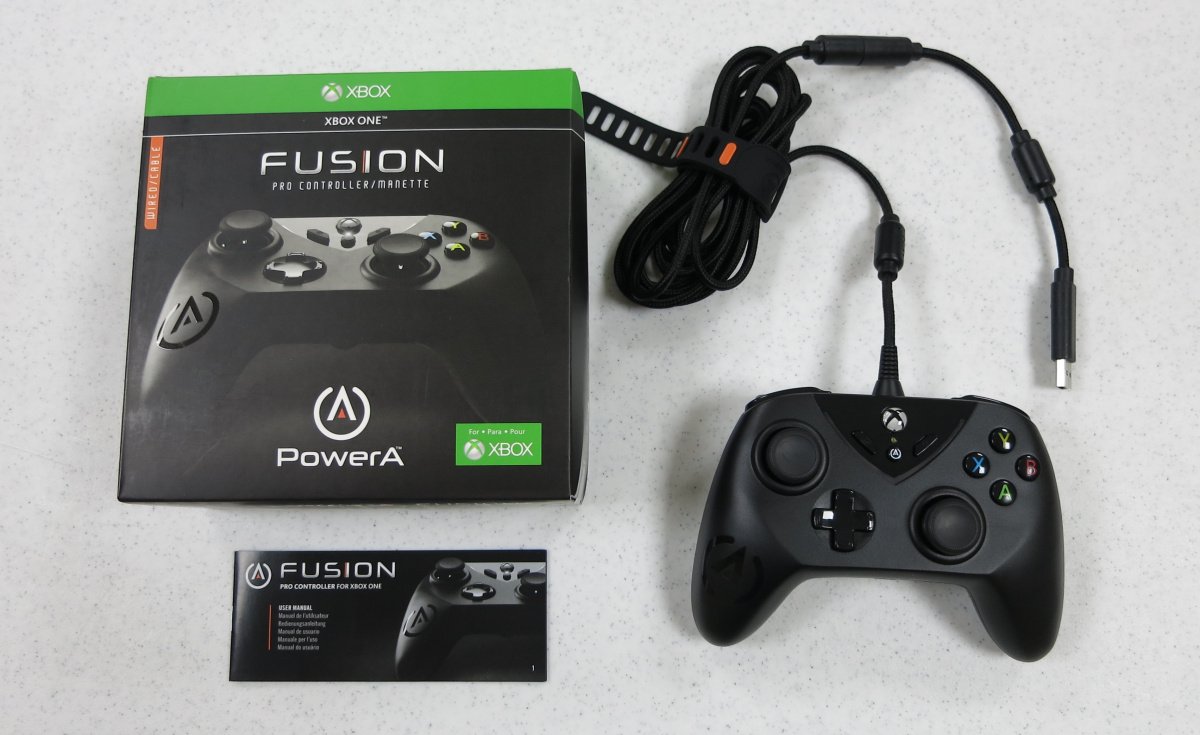
Body, Sticks, and buttons
The Fusion Pro Controller's body closely resembles that of a standard Xbox One controller, albeit with sharper angles on the front of the hand grips. The bulk of the controller consists of matte black plastic with a mild texture. The front left grip wears an embossed PowerA logo.
Get the Windows Central Newsletter
All the latest news, reviews, and guides for Windows and Xbox diehards.
The traditional glossy black plastic area at the top of the control shows up as well, but with a rather unique design. Here the glossy plastic on the front forms a rounded Reuleaux triangle shape and does not extend to the actual top of the controller. The bumpers and triggers still use glossy plastic though. Naturally these glossy areas show hand grease, so I'd prefer an all matte design.
PowerA has always made a decent D-Pad, and the Fusion Pro's is no exception. It closely resembles the standard Microsoft directional pad, although I find this one slightly stiffer. The only downside to this D-Pad is that it doesn't stand out like the unique pads of the Elite and Wildcat.
The analog sticks do stand out, however. Their necks are noticeably thicker and about 1mm taller than those of the Elite. And the tops measure a whopping 20mm wide, about 9mm greater than the Elite's default stick tops. Their textured edges won't collect dirt like Microsoft's stick tops.
Do analog stick tops need to be two centimeters wide? Probably not, though I don't mind. Rather than keep my thumbs planted in the center of these pizza-sized tops, I keep them a few millimeters lower. People with small hands might just find them too massive, but I expect most will adjust as they'd do with any new controller.
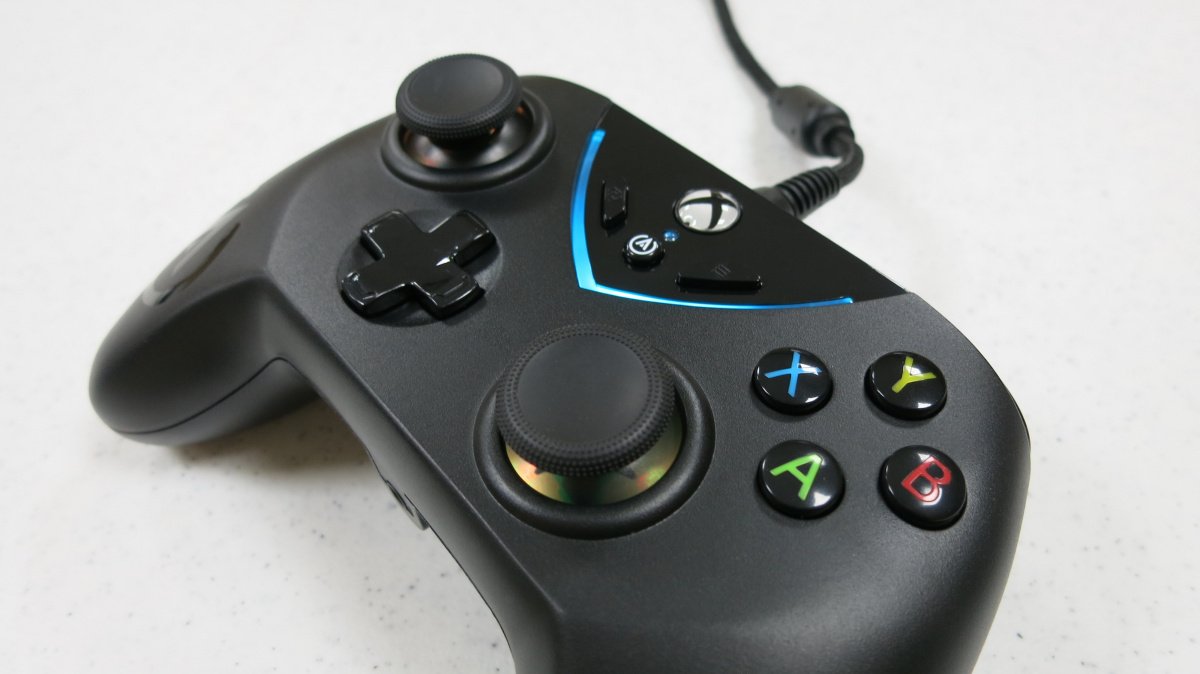
Lighting
The Fusion Pro has one standout feature that neither the Elite nor Wildcat can claim: colorful lighting! Like PowerA's previous Spectra Controller, this one includes three lighting control buttons on its back. The first turns on a light along the lower rim of the triangular area at the top of the controller face. The bottom button lights up both analog stick bases. And the middle button switches between four brightness levels.
Pressing the triangle or stick lighting buttons additional times will toggle between lighting modes:
- Color cycling pattern 1
- Color cycling pattern 2
- Pink
- Amber
- Green 1
- Green 2
- Green 3
- Green 4
- Blue 1
- Blue 2
- Blue 3
- Blue 4
- Blue 5
- Blue 6
- Purple 1
- Purple 2
- Purple 3
- Off
The lighting has its ups and downs. Compared to colored lighting options found in computer peripherals, you get far less colors here, and most are variants of the same colors. Also, the controller doesn't remember lighting settings. So if you turn the console off or unplug the cable, you'll have to turn them back on the next time you use it. The Fusion Pro does save custom button settings, so it seems like an oversight that the lighting patterns don't save too.
Those complaints aside, I still love that the controller has semi-customizable lighting. It doesn't sport a ton of distinct colors, but you can set up the Windows Central blue and pink pretty easily. And it's cool that we can turn on and adjust the stick and face lighting independently. I hope Xbox One gets more high quality controllers with lighting in the future.
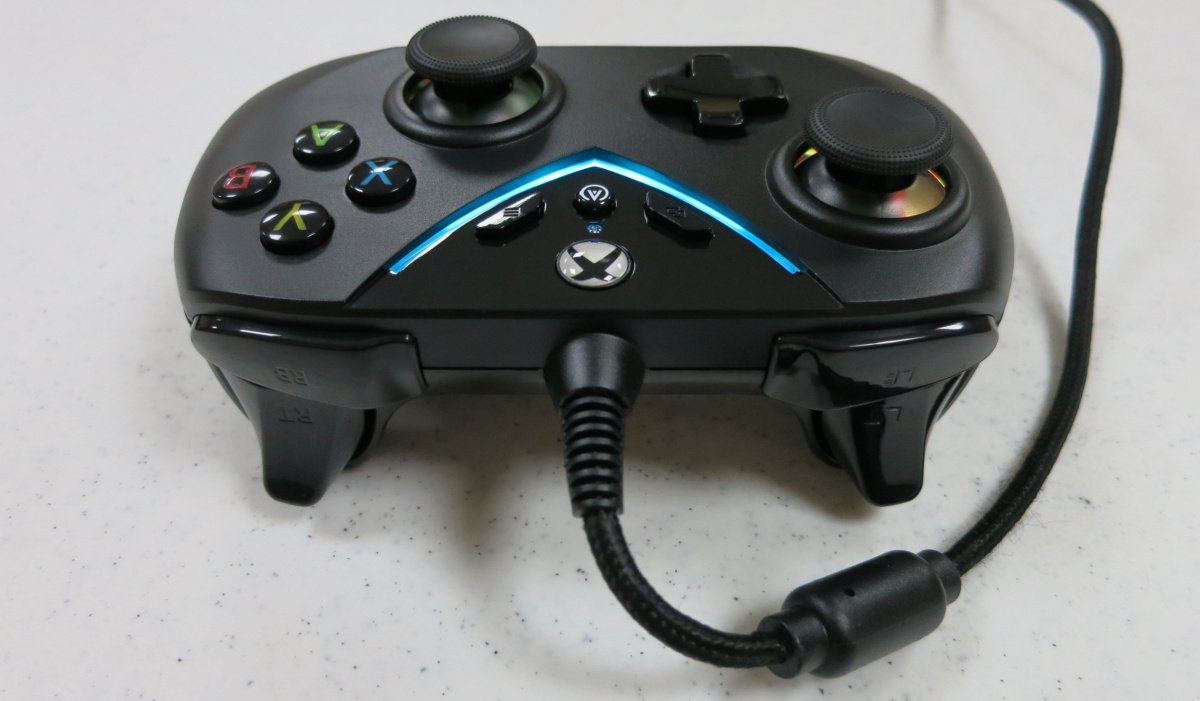
Triggers and locks
The bumpers and triggers of the Fusion Pro differ slightly from their Microsoft equivalents. The bumper shape makes it harder to keep your finger on both bumper and trigger simultaneously, so you end up having to move it from the trigger to hit the bumper. Not a huge deal, but Microsoft and Razer have better designs. The triggers themselves are good, though they have slightly less travel and lack the perfect resistance of the Elite's.
Fortunately, the Fusion Pro offers one of the key features of the Elite and Wildcat: trigger locks. Just flip the two switches on the back and you can lock both triggers, limiting their range of movement. This will let you fire non-automatic weapons more rapidly since you don't have to press the triggers down as far.
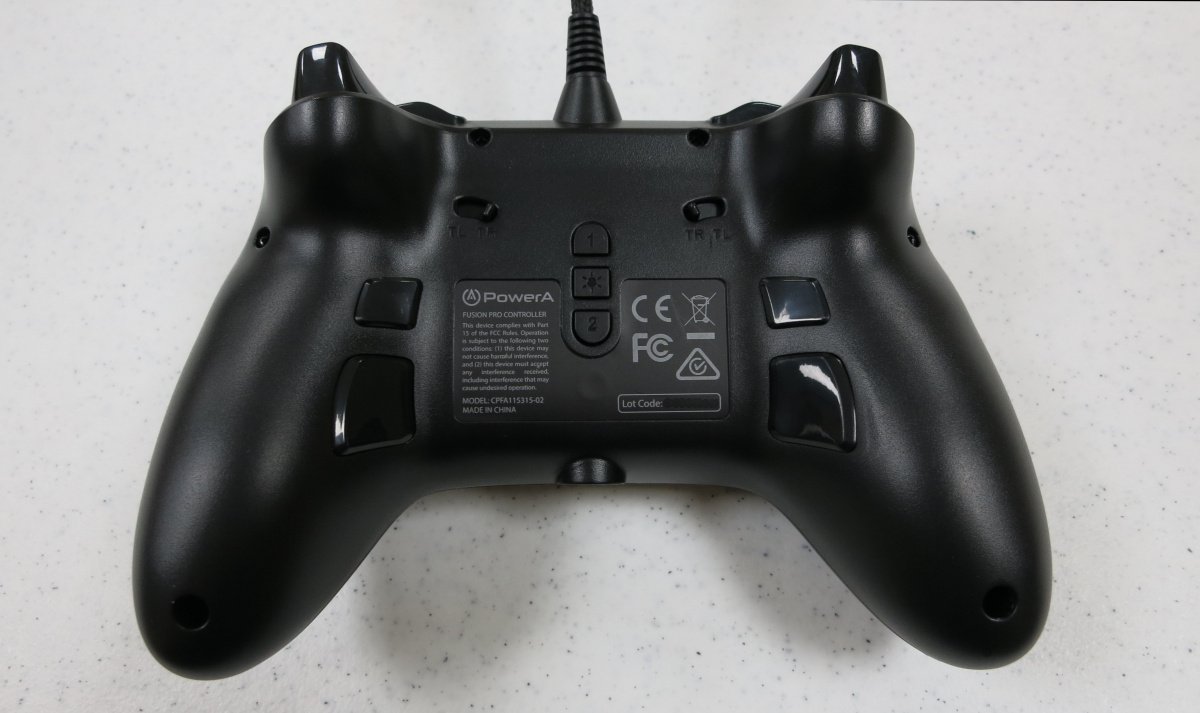
Programmable buttons
The Elite, Wildcat, and Fusion Pro all include four extra programmable buttons – and their implementations differ widely. Rather than paddles like the Elite controller, the Fusion Pro sports four regular buttons on the back of its controller grips.
The bottom buttons are much larger than the top ones, making them easier to tell apart by touch. The button positioning ensures that your middle and ring fingers will naturally sit over them while holding the controller. I have accidentally pressed them a few times, but only when gripping the controller too hard.
Unlike the Elite's problematic paddles, these extra buttons don't get pressed when setting the controller down, and will rarely be hit by mistake. And even if you do hit them by mistake, they do nothing by default. You have to program them to give them a function, so you can effectively disable them by deprogramming them. That said, I'd rather they mirrored the bumper and triggers by default instead of doing nothing.
Programming the extra buttons is easy. Press and hold the PowerA button found just under the Home/Guide button for two seconds and the face light starts to blink. Press the button whose function you want to copy, and then press the programmable button to complete the process. It would make more sense to press the programmable button first instead, but you get used to it.
The buttons that can be copied to the extra buttons include the four face buttons, the bumpers, triggers, and the stick buttons (clicking in the analog sticks). Disappointingly, View/Back, Menu/Start, and D-Pad directions can't be assigned to the programmable buttons. The Wildcat has the Fusion Pro beat there, but most people will only want to duplicate the face buttons anyway.
The Fusion Pro only offers a single profile for programmed buttons. Entering programming mode and then holding the PowerA button for five seconds will reset the memory to its default state.

Headset support and Windows compatibility
The Fusion Pro has a 3.5mm headset jack on its bottom, which is good. But it lacks a data port, which means you can't use the Chatpad with this controller. No third-party controllers currently offer data ports, so the absence seems to be a restriction imposed by Microsoft.
Like the Razer Wildcat, the Fusion Pro is fully compatible with Windows 7, 8, and 10. Just plug it in and install the standard Xbox One controller driver if necessary. The four programmable buttons and lighting will function exactly as they do when used with the Xbox One.
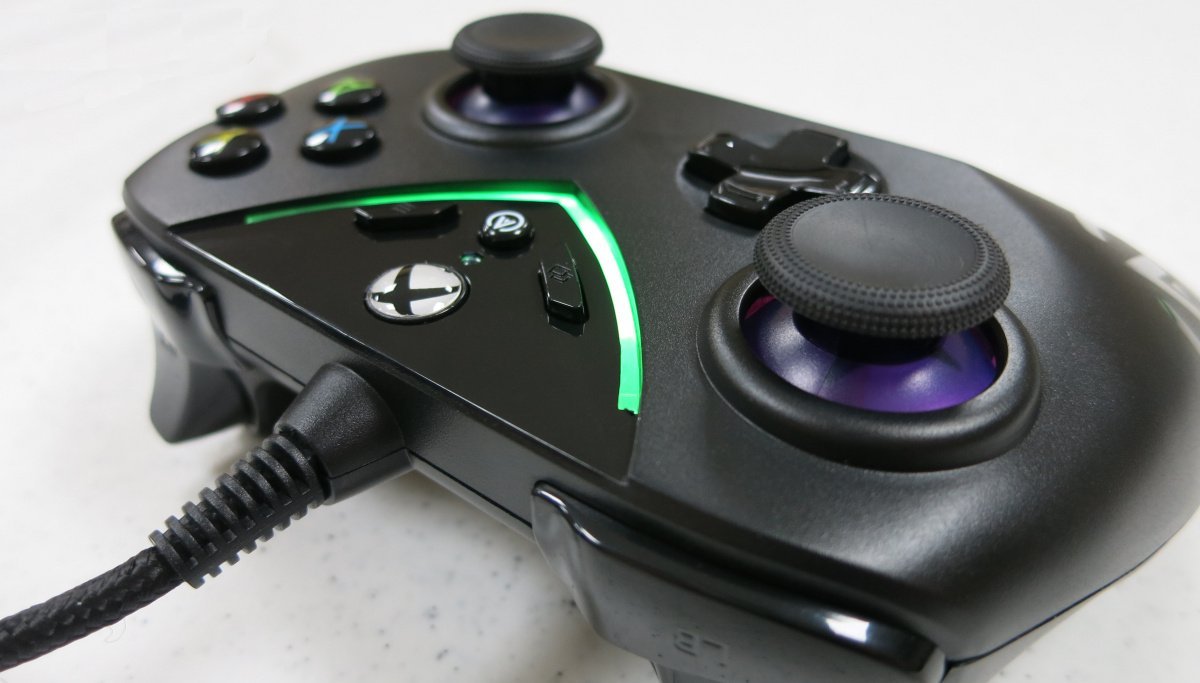
Overall Impression
PowerA's Fusion Pro Controller presents a fine alternative to the Elite and Wildcat controllers. Don't get me wrong, the construction is not nearly as deluxe as those luxury controllers and it lacks some of their bells and whistles. But it does offer programmable buttons and trigger stops, which are the main selling points of the $150 controllers. And it stands out with some fancy lighting too.
Would I recommend you get the Fusion Pro instead of the Elite or Wildcat? If you can afford it, I still say go with the Elite. I greatly dislike the paddles, but in every other way the Elite is a perfect, standout controller. The Wildcat has the best programmable buttons but falls behind the Elite in a few other ways.
The Fusion Pro is for people who scoff at the idea of spending $150 on a controller. This one provides a strong arsenal of features for just $20 more than a standard controller. The lack of wireless and Chatpad support are its only real failings, and those both result from restrictions imposed by Microsoft. If you can live without the Chatpad, you should be very happy with the Fusion Pro Controller.
Paul Acevedo is the Games Editor at Windows Central. A lifelong gamer, he has written about videogames for over 15 years and reviewed over 350 games for our site. Follow him on Twitter @PaulRAcevedo. Don’t hate. Appreciate!

